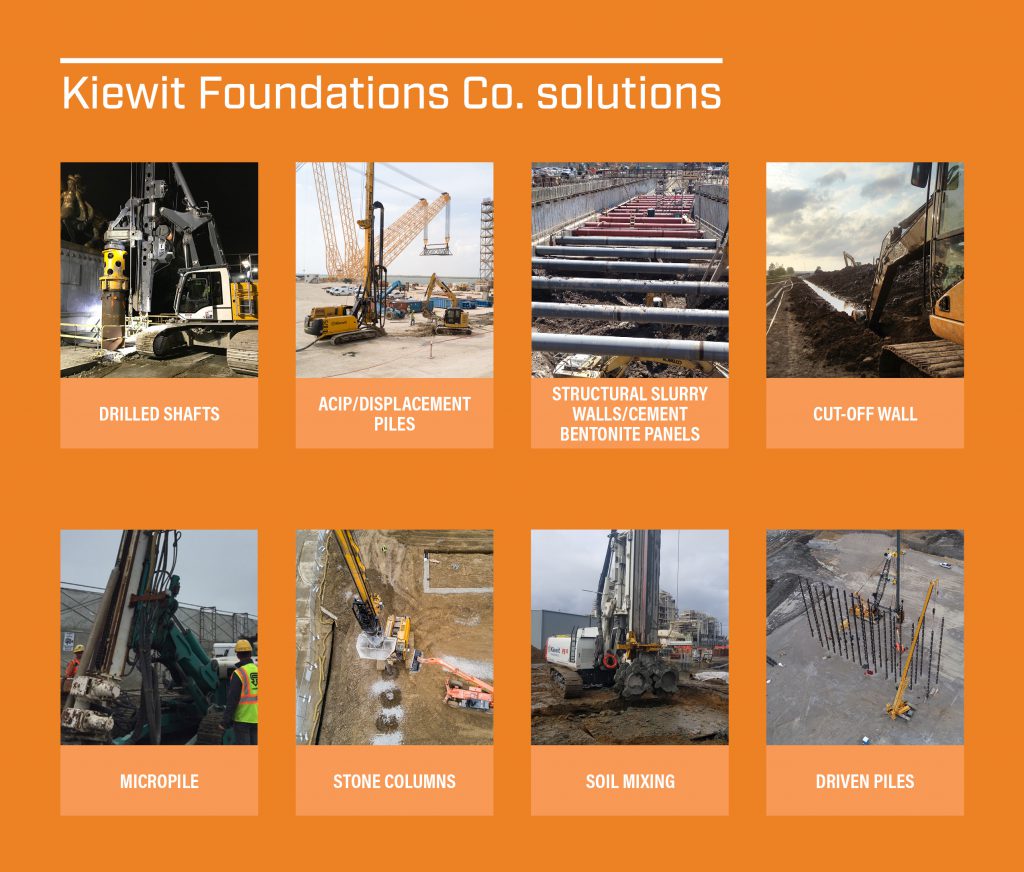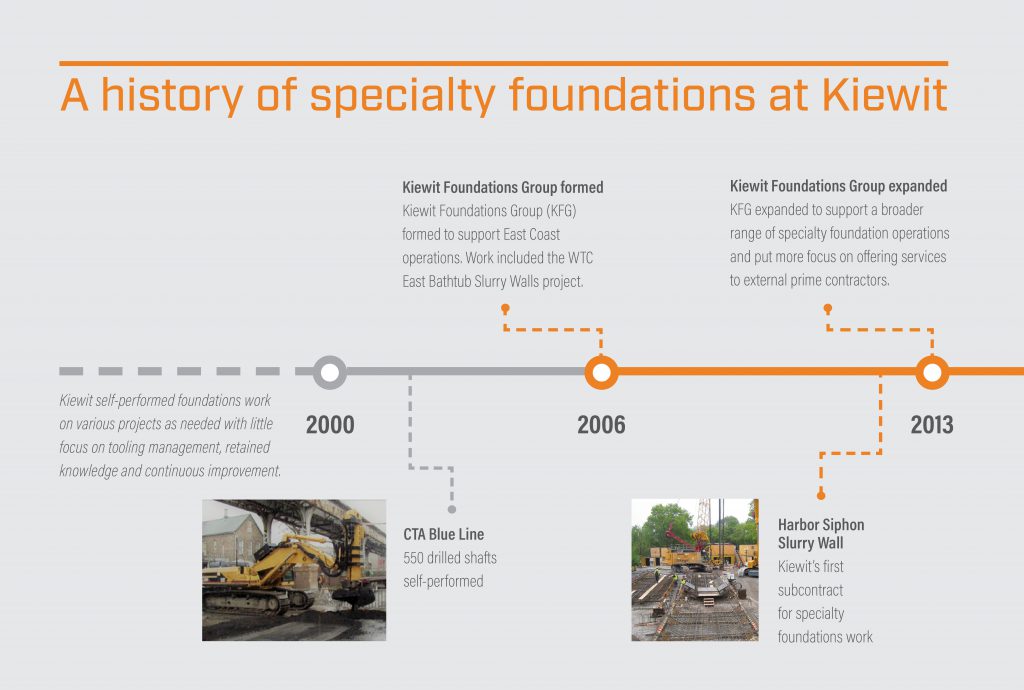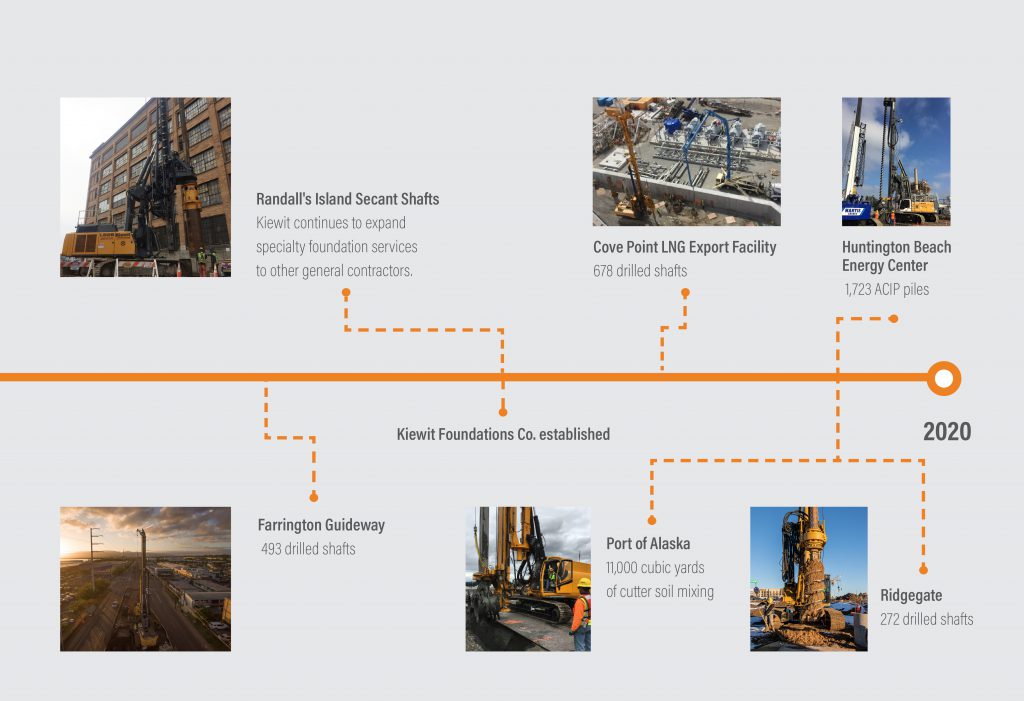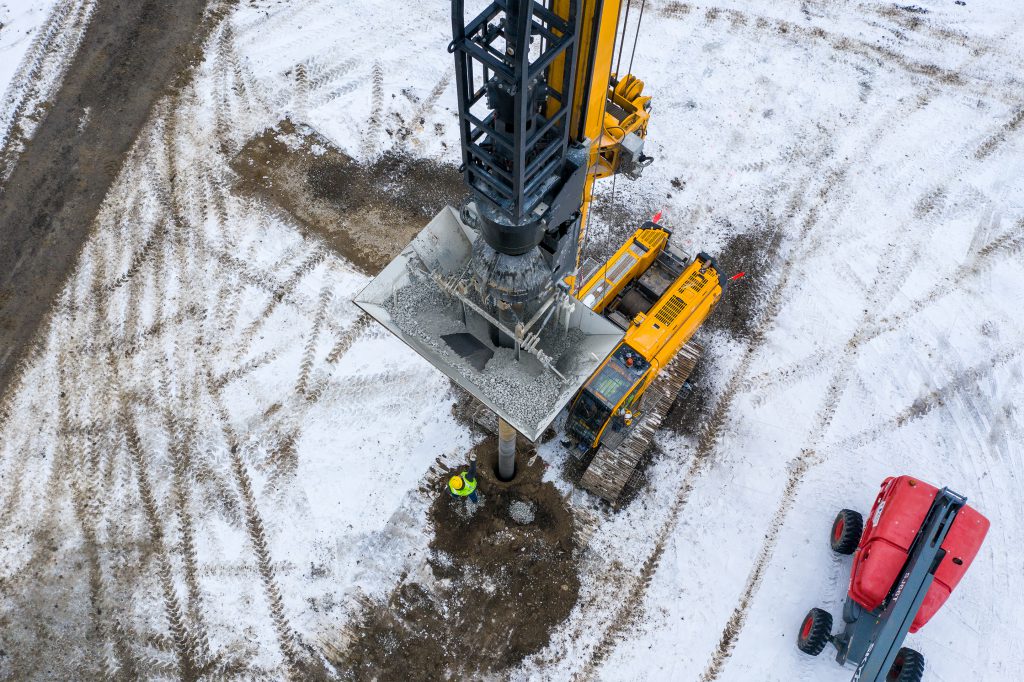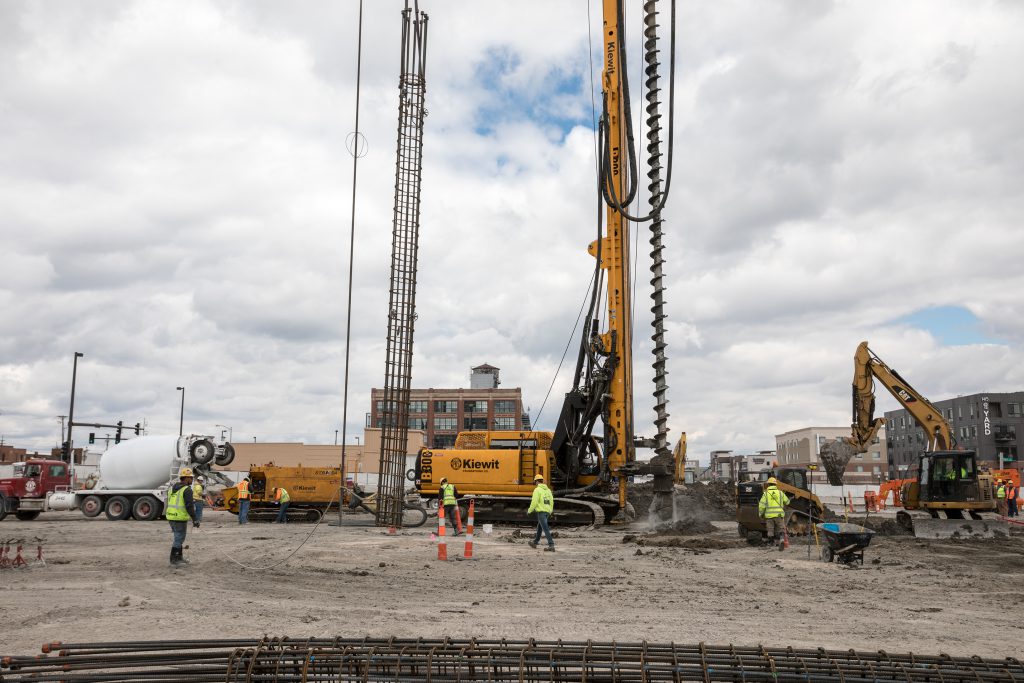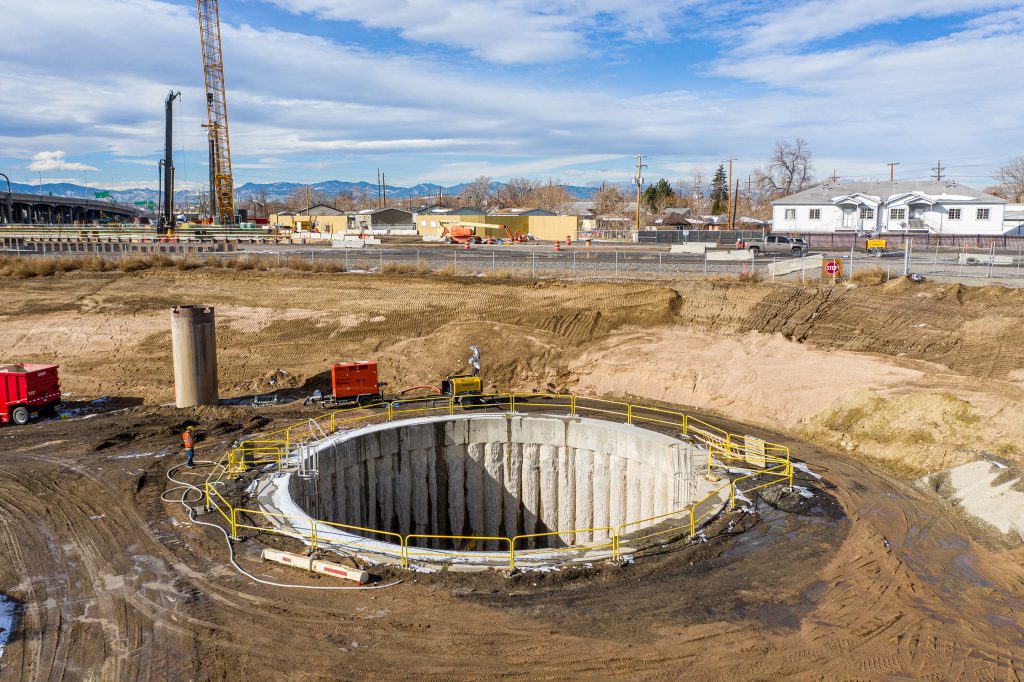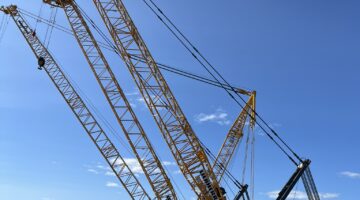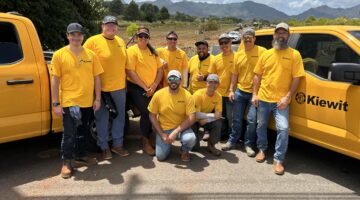Kiewit pioneers a deeper path down the specialty foundations market.
It’s easy to spot one of Kiewit’s iconic construction projects. They’re often large, complicated and important to our communities, the economy and even our day-to-day lives. What you don’t see is the complexity of the work happening below grade — the specialized techniques used to improve the sub-soils or to transfer the weight of a structure deeper below ground for better stability and safety. Kiewit now has a dedicated team of specialty foundations experts focused on geotechnical services and equipment for nearly every environment and industry market.
“The more diverse our capabilities and techniques, the better suited we are to react to the unexpected,” said Project Manager Chris Parinella.
That experience is important because soil differs from region to region and, sometimes, within a matter of feet across a single jobsite. That means there can be a lot of unknowns and risk to manage.
Kiewit Foundations Co. is currently working on 16 projects across North America. Its services include structural and ground improvement solutions ranging from drilled shafts and stone columns to micropiles, driven piles, rigid inclusions and soil mixing.
While Kiewit Foundations Co. is a fairly new arm of the company, Kiewit’s experience as a specialty foundations contractor is not.
“We have selectively self-performed foundations work for a long time,” said Kiewit Foundations Co. President Chad Jessen. “The decision to invest in and commit to growing Kiewit’s presence in the specialty foundation market was driven by our desire to have better control over cost and schedule for our clients.”
Jessen says that in the past, Kiewit has experienced mixed results from the marketplace in terms of quality, schedule, cost-certainty or even finding someone who is capable of building the work.
“The current market is divided among a few large firms and numerous smaller, niche service companies. Kiewit’s ability to compete as a local specialty contractor with global resources allows us to participate in this market in a way no other company can,” said Jessen.
Self-performing the specialty foundations scope on Kiewit projects ensures Kiewit Foundations Co.’s growth within the company, but Jessen says the need goes beyond that.
“We also see demand for our services outside of Kiewit, working for other general contractors as a subcontractor and providing them the differentiating service we are able to provide ourselves,” he said, which also creates new market revenue and profit for Kiewit.
Jessen explained foundations work has a large barrier to entry — it requires expensive, specialized equipment and the ability to manage those resources effectively. Kiewit’s large, diverse fleet is up for the challenge.
“Today, we have over 30 specialty drills that can install a wide array of deep foundations or ground improvement elements,” said Jessen. “Our drilling fleet is accompanied by a wide range of pumps, batch plants, cranes, pile hammers and other specialty support equipment, not to mention $20 million of tooling.”
Many of those tools and equipment are fully loaded with new, cutting-edge data acquisition systems, something Parinella says also helped Kiewit Foundations Co. to get off on the right foot.
“As we move forward, there’s always more and more need for data from the engineers and owners who want to see it, but also within Kiewit. We’re a very data-driven company,” he explained. “And this work requires a different kind of data than we’ve collected over the years.”
Competing in North America’s foundations market also requires construction-focused engineering and a fiercely loyal, specialized workforce that goes where the work needs to be done.
“We continue to hire and expand our team,” said Jessen. “Virtually all of our drillers and other skilled craft are consistent and long-term team members who travel project to project with us. Our engineering team has also grown rapidly, and we now have about 60 in-house geotechnical engineers within Kiewit Engineering Group who have regional expertise and support our growing business,” he said.
Kiewit Foundations installed 1,022 non-vibratory stone columns at the new Kiewit Headquarters in Omaha, Nebraska. Each is 24 inches in diameter with a depth ranging from 20 to 30 feet. Kiewit is the only contractor that has installed non-vibratory stone columns in North America.
For structural support, 105 augered cast-in-place (ACIP) piles were drilled at the Kiewit headquarters in Omaha, Nebraska. Each was 24 inches in diameter and 56 feet deep.
Many of those experts, like Parinella and Kiewit Foundations Co. Sponsor Andy Anderson, are veterans in their field who saw an exciting opportunity at Kiewit for both the foundations industry and their own career growth.
“Over my most recent 25 years in foundations, Kiewit was probably my biggest client. The company I worked for, which is a big player in the foundations industry, often tried to emulate Kiewit,” recalled Anderson. “They would ask, ‘How would Kiewit do this?’ That’s a big draw. Foundations professionals find strength in the Kiewit name.”
Anderson says he never viewed Kiewit Foundations Co. as a startup, even in its earliest days.
“I viewed it as part of the Kiewit organization. The breadth of resources — people and equipment — is unmatched. The footprint that Kiewit has allows it to compete everywhere. It’s very diversified and, in specialty foundations, only the top tier have that kind of footprint,” said Anderson.
According to Greg Boonstra, another foundations professional who joined Kiewit a year ago, that footprint is getting even bigger.
“The speed of growth and willingness to invest is something that I haven’t experienced before while working for other specialty foundation contractors,” said Boonstra. “I’ve been involved with the Central 70 project for the last year and I’ve been happy and proud to be part of this megaproject in my hometown of Denver. The opportunity to work for Kiewit was appealing to me because Kiewit builds some very complex and iconic projects.”
For Parinella, a former mining engineer, consultant and construction manager with years of experience in geotechnical work and equipment, it was Kiewit’s entrepreneurial spirit that was the biggest draw. He joined Kiewit after helping grow another company from the ground up.
“That experience was exhilarating, but it was a lot of effort, and we didn’t have the full interaction with the parent organization that we have here at Kiewit,” he recalled. “Everyone is committed to making this a success. That coupled with Kiewit’s reputation and its determination to get things done right, it’s not hard to imagine what’s on the horizon.”
The potential is especially easy to imagine when you consider the amount of foundations work that runs across all of Kiewit’s seven core business markets. Market type, geography and equipment can be obstacles for other key players in foundations work, but that kind of diversification is built into Kiewit’s overall business model. According to Jessen, it’s the perfect environment for Kiewit Foundations Co. to dig in and get the work done.
“As a general contractor we understand the crucial nature of this work and the need to get out of the ground fast and with the highest quality. Kiewit brings a client-centric approach to foundations because we are the client most of the time.”
